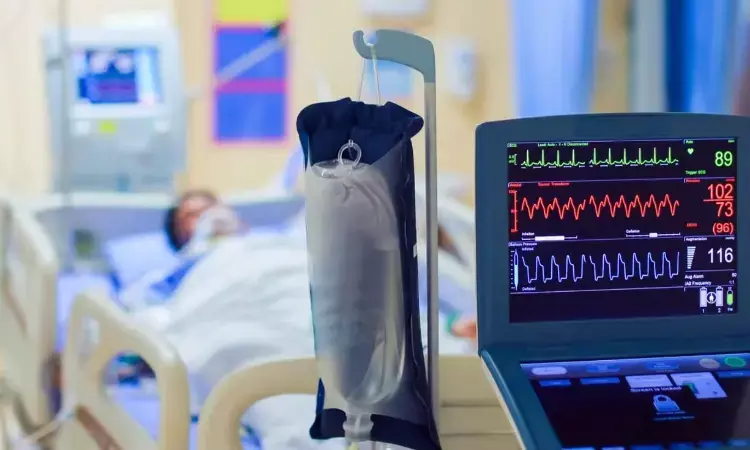- Home
- Medical news & Guidelines
- Anesthesiology
- Cardiology and CTVS
- Critical Care
- Dentistry
- Dermatology
- Diabetes and Endocrinology
- ENT
- Gastroenterology
- Medicine
- Nephrology
- Neurology
- Obstretics-Gynaecology
- Oncology
- Ophthalmology
- Orthopaedics
- Pediatrics-Neonatology
- Psychiatry
- Pulmonology
- Radiology
- Surgery
- Urology
- Laboratory Medicine
- Diet
- Nursing
- Paramedical
- Physiotherapy
- Health news
- Fact Check
- Bone Health Fact Check
- Brain Health Fact Check
- Cancer Related Fact Check
- Child Care Fact Check
- Dental and oral health fact check
- Diabetes and metabolic health fact check
- Diet and Nutrition Fact Check
- Eye and ENT Care Fact Check
- Fitness fact check
- Gut health fact check
- Heart health fact check
- Kidney health fact check
- Medical education fact check
- Men's health fact check
- Respiratory fact check
- Skin and hair care fact check
- Vaccine and Immunization fact check
- Women's health fact check
- AYUSH
- State News
- Andaman and Nicobar Islands
- Andhra Pradesh
- Arunachal Pradesh
- Assam
- Bihar
- Chandigarh
- Chattisgarh
- Dadra and Nagar Haveli
- Daman and Diu
- Delhi
- Goa
- Gujarat
- Haryana
- Himachal Pradesh
- Jammu & Kashmir
- Jharkhand
- Karnataka
- Kerala
- Ladakh
- Lakshadweep
- Madhya Pradesh
- Maharashtra
- Manipur
- Meghalaya
- Mizoram
- Nagaland
- Odisha
- Puducherry
- Punjab
- Rajasthan
- Sikkim
- Tamil Nadu
- Telangana
- Tripura
- Uttar Pradesh
- Uttrakhand
- West Bengal
- Medical Education
- Industry
Frailty increases the mortality risk by two-fold in middle-aged ICU patients.

Sweden: A new study found that premorbid frailty is independently associated with mortality, and it increased the mortality risk by two-fold in middle-aged patients. It is commonly seen in nearly 55% of all ICU patients under 64 years. The study results were published in the journal Annals of Intensive care.
Frailty assessment is a multidimensional syndrome indicating an increased vulnerability to stressors and has been extensively used recently in geriatrics in Intensive care units. Previous studies have shown that frailty increases negative outcomes and increases the risk of mortality in old-age intensive care patients. But its effect in younger populations is uncertain. Hence Lina De Geer et al from Linköping University, Linköping, Sweden conducted a prospective observational study in a tertiary-level mixed ICU to assess the impact of frailty on long-term survival in intensive care patients of different ages.
From nearly 817 adult ICU patients, data were collected on various factors like premorbid frailty using the Clinical Frailty Score (CFS), the severity of illness using the Simplified Acute Physiology Score, (third version; SAPS3), limitations of care and outcome. Within 6 months (180 days) after ICU admission Hazard ratios (HR) for death were calculated. The association of frailty with outcome in different age groups was evaluated using the unadjusted and adjusted analyses.
Key findings of the study:
- Patients were classified into predefined age groups of 18–49 years (n = 241), 50–64 (n = 188), 65–79 (n = 311), and 80 years or older (n = 77)).
- The overall proportion of frail (CFS ≥ 5) patients was 41% (n = 333) in the total participants and frail increased with each age stratum.
- There were more treatment restrictions, higher SAPS3, and higher ICU mortality among frail patients.
- An increased risk of 180-day mortality was observed in all age groups with Frailty.
- After adjustment for SAPS3, comorbidity, and limitations of treatment, the effect was significant only in patients aged 50–64 years.
Thus, frailty can be used as a tool for assessing the mortality risk in younger ICU patients.
Further reading: De Geer, L., Fredrikson, M. & Chew, M.S. Frailty is a stronger predictor of death in younger intensive care patients than in older patients: a prospective observational study. Ann. Intensive Care 12, 120 (2022). https://doi.org/10.1186/s13613-022-01098-2
BDS, MDS
Dr.Niharika Harsha B (BDS,MDS) completed her BDS from Govt Dental College, Hyderabad and MDS from Dr.NTR University of health sciences(Now Kaloji Rao University). She has 4 years of private dental practice and worked for 2 years as Consultant Oral Radiologist at a Dental Imaging Centre in Hyderabad. She worked as Research Assistant and scientific writer in the development of Oral Anti cancer screening device with her seniors. She has a deep intriguing wish in writing highly engaging, captivating and informative medical content for a wider audience. She can be contacted at editorial@medicaldialogues.in.
Dr Kamal Kant Kohli-MBBS, DTCD- a chest specialist with more than 30 years of practice and a flair for writing clinical articles, Dr Kamal Kant Kohli joined Medical Dialogues as a Chief Editor of Medical News. Besides writing articles, as an editor, he proofreads and verifies all the medical content published on Medical Dialogues including those coming from journals, studies,medical conferences,guidelines etc. Email: drkohli@medicaldialogues.in. Contact no. 011-43720751




